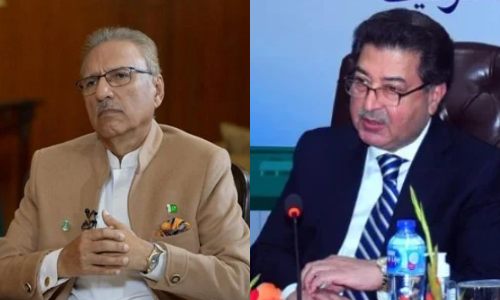ISLAMABAD: The Election Commission of Pakistan (ECP) has issued a response to President Arif Alvi’s recent communication, in which he extended an invitation to Chief Election Commissioner (CEC) Sikandar Sultan Raja. The president’s invitation pertained to the fixation of the date for upcoming polls.
However, the ECP’s response highlighted the constitutional amendments that have reshaped the president’s authority in this regard.
The developments unfolded during a meeting presided over by CEC Raja, focusing on the implications of President Alvi’s letter. It was determined during the meeting that the president’s capacity to set election dates had been curtailed due to amendments in election laws, rendering the current interaction of “scant consequence.”
In his letter to CEC Raja, President Alvi underlined the constitutional obligations stemming from the dissolution of the National Assembly on August 9, 2023, as per Article 48(5) of the Constitution. The president invoked this dissolution to emphasize the necessity of designating a date for the general election of the National Assembly, stipulating that this date should not exceed 90 days from the dissolution.
The president’s letter stated, “Given the circumstances, the Chief Election Commissioner is requested to meet with the President either today or tomorrow to finalize an appropriate date.”
CEC Raja’s response addressed the grounds on which the National Assembly was dissolved on August 9, 2023, under the provisions of Article 58(1) of the Constitution. The communication highlighted the recent amendment to Section 57 of the Elections Act, 2017, which has expanded the ECP’s jurisdiction regarding election arrangements.
“Prior to the amendment of Section 57(1) of the act mentioned above, the president was required to consult the commission in accordance with Section 57 of the Elections Act, 2017, before confirming an election date. However, following the amendment in Section 57, the commission is now vested with the authority to announce the specific date or dates for the General Elections,” the response detailed.
Furthermore, the response clarified that the president retains the right to set an election date under specific circumstances, particularly if the National Assembly’s dissolution aligns with the stipulations of Article 58(2) in conjunction with Article 48(5) of the Constitution.
The Election Commission underscored that in cases where the assembly is dissolved based on the prime minister’s advice or due to the passage of time, as outlined in Article 58(1) of the Constitution, the sole authority to appoint election dates lies with the commission.
The response respectfully contested the applicability of the constitutional provisions cited in the president’s letter to the present context, stating, “With the utmost respect, the commission believes that the reliance placed on the Constitution’s provisions, as mentioned in your subject letter, does not align with the current circumstances.”
CEC Raja’s communication also brought attention to the essential matter of revisiting constituency boundaries following the approval of the 2023 census results. This, he asserted, stands as a pivotal legal step in the election process.
“Considering the latest census officially published on August 7, 2023, the commission has taken the decision to undertake a fresh delimitation of constituencies as mandated by section 17(2) of the Elections Act, 2017, in order to safeguard the rights of contesting candidates, political parties, and electorates as enshrined in Article 17(2) of the Constitution.”
Responding to criticisms about election delays, CEC Raja affirmed the ECP’s earnest commitment to its role in organizing the general election. He further noted the initiation of consultations with major political parties to seek their input on the electoral roadmap.
“In light of the aforementioned considerations, the commission holds the view that participating in the proposed meeting would yield limited significance.”
(Islamabad51-Newsdesk)














